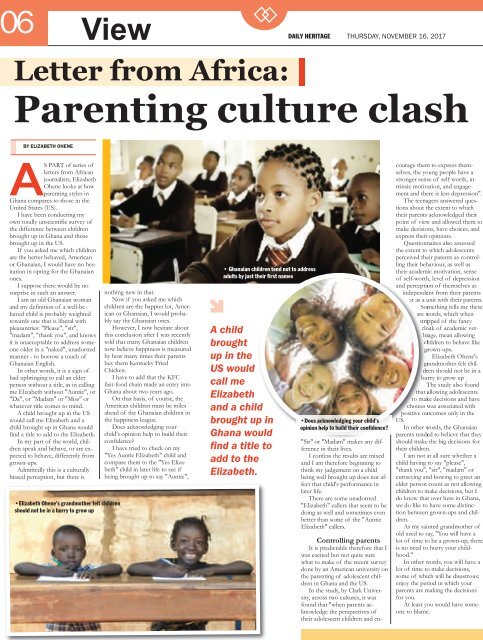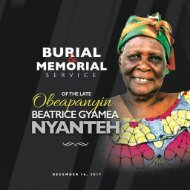Daily Heritage November 16
Create successful ePaper yourself
Turn your PDF publications into a flip-book with our unique Google optimized e-Paper software.
Nov <strong>16</strong>/17 NEW.qxp_Layout 1 11/15/17 9:06 PM Page 5<br />
06<br />
View<br />
WWW.DAILYHERITAGE.COM.GH<br />
DAILY HERITAGE THURSDAY, NOVEMBER <strong>16</strong>, 2017<br />
Letter from Africa:<br />
Parenting culture clash<br />
BY ELIZABETH OHENE<br />
AS PART of series of<br />
letters from African<br />
journalists, Elizabeth<br />
Ohene looks at how<br />
parenting styles in<br />
Ghana compares to those in the<br />
United States (US).<br />
I have been conducting my<br />
own totally unscientific survey of<br />
the difference between children<br />
brought up in Ghana and those<br />
brought up in the US.<br />
If you asked me which children<br />
are the better behaved, American<br />
or Ghanaian, I would have no hesitation<br />
in opting for the Ghanaian<br />
ones.<br />
I suppose there would be no<br />
surprise in such an answer.<br />
I am an old Ghanaian woman<br />
and my definition of a well-behaved<br />
child is probably weighted<br />
towards one that is liberal with<br />
pleasantries: "Please", "sir",<br />
"madam", "thank you", and knows<br />
it is unacceptable to address someone<br />
older in a "naked", unadorned<br />
manner - to borrow a touch of<br />
Ghanaian English.<br />
In other words, it is a sign of<br />
bad upbringing to call an elder<br />
person without a title, as in calling<br />
me Elizabeth without "Auntie", or<br />
"Da", or "Madam" or "Miss" or<br />
whatever title comes to mind.<br />
A child brought up in the US<br />
would call me Elizabeth and a<br />
child brought up in Ghana would<br />
find a title to add to the Elizabeth.<br />
In my part of the world, children<br />
speak and behave, or are expected<br />
to behave, differently from<br />
grown-ups.<br />
Admittedly this is a culturally<br />
biased perception, but there is<br />
•Elizabeth Ohene's grandmother felt children<br />
should not be in a hurry to grow up<br />
nothing new in that.<br />
Now if you asked me which<br />
children are the happier lot, American<br />
or Ghanaian, I would probably<br />
say the Ghanaian ones.<br />
However, I now hesitate about<br />
this conclusion after I was recently<br />
told that many Ghanaian children<br />
now believe happiness is measured<br />
by how many times their parents<br />
buy them Kentucky Fried<br />
Chicken.<br />
I have to add that the KFC<br />
fast-food chain made an entry into<br />
Ghana about two years ago.<br />
On that basis, of course, the<br />
American children must be miles<br />
ahead of the Ghanaian children in<br />
the happiness league.<br />
Does acknowledging your<br />
child's opinion help to build their<br />
confidence?<br />
I have tried to check on my<br />
"Yes Auntie Elizabeth" child and<br />
compare them to the "Yes Elizabeth"<br />
child in later life to see if<br />
being brought up to say "Auntie",<br />
• Ghanaian children tend not to address<br />
adults by just their first names<br />
A child<br />
brought<br />
up in the<br />
US would<br />
call me<br />
Elizabeth<br />
and a child<br />
brought up in<br />
Ghana would<br />
find a title to<br />
add to the<br />
Elizabeth.<br />
•Does acknowledging your child's<br />
opinion help to build their confidence?<br />
"Sir" or "Madam" makes any difference<br />
in their lives.<br />
I confess the results are mixed<br />
and I am therefore beginning to<br />
think my judgement on a child<br />
being well brought up does not affect<br />
that child's performance in<br />
later life.<br />
There are some unadorned<br />
"Elizabeth" callers that seem to be<br />
doing as well and sometimes even<br />
better than some of the "Auntie<br />
Elizabeth" callers.<br />
Controlling parents<br />
It is predictable therefore that I<br />
was excited but not quite sure<br />
what to make of the recent survey<br />
done by an American university on<br />
the parenting of adolescent children<br />
in Ghana and the US.<br />
In the study, by Clark University,<br />
across two cultures, it was<br />
found that "when parents acknowledge<br />
the perspectives of<br />
their adolescent children and encourage<br />
them to express themselves,<br />
the young people have a<br />
stronger sense of self-worth, intrinsic<br />
motivation, and engagement<br />
and there is less depression".<br />
The teenagers answered questions<br />
about the extent to which<br />
their parents acknowledged their<br />
point of view and allowed them to<br />
make decisions, have choices, and<br />
express their opinions.<br />
Questionnaires also assessed<br />
the extent to which adolescents<br />
perceived their parents as controlling<br />
their behaviour, as well as<br />
their academic motivation, sense<br />
of self-worth, level of depression<br />
and perception of themselves as<br />
independent from their parents<br />
or as a unit with their parents.<br />
Something tells me these<br />
are words, which when<br />
stripped of the fancy<br />
cloak of academic verbiage,<br />
mean allowing<br />
children to behave like<br />
grown-ups.<br />
Elizabeth Ohene's<br />
grandmother felt children<br />
should not be in a<br />
hurry to grow up<br />
The study also found<br />
that allowing adolescents<br />
to make decisions and have<br />
choices was associated with<br />
positive outcomes only in the<br />
US.<br />
In other words, the Ghanaian<br />
parents tended to believe that they<br />
should make the big decisions for<br />
their children.<br />
I am not at all sure whether a<br />
child having to say "please",<br />
"thank you", "sir", "madam" or<br />
curtseying and bowing to greet an<br />
elder person count as not allowing<br />
children to make decisions, but I<br />
do know that over here in Ghana,<br />
we do like to have some distinction<br />
between grown-ups and children.<br />
As my sainted grandmother of<br />
old used to say, "You will have a<br />
lot of time to be a grown-up, there<br />
is no need to hurry your childhood."<br />
In other words, you will have a<br />
lot of time to make decisions,<br />
some of which will be disastrous;<br />
enjoy the period in which your<br />
parents are making the decisions<br />
for you.<br />
At least you would have someone<br />
to blame.


















